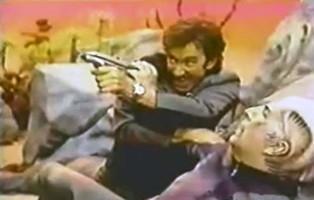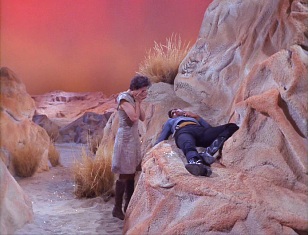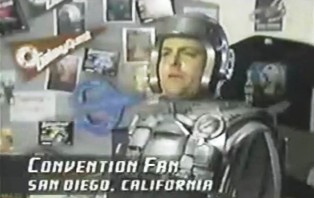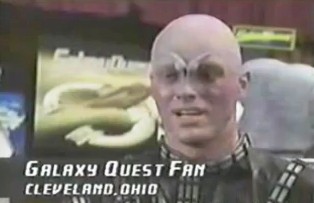During his interview, Nesmith starts to go into an AFTRA problem
that was going on at the time he was doing Galaxy Quest,
implying it had to do with he and the rest of the cast not getting
paid much for their roles in the series. AFTRA was a real world
union for performers, the American Federation of Television and
Radio Artists. In 2012, it merged with SAG, the Screen Actors Guild,
yielding the new, single union, SAG-AFTRA.
At 1:06 in the special, a Variety headline
appears, from the May 1, 1982 edition, announcing the cancellation
of the
Galaxy Quest TV series.
Variety is a tabloid covering the entertainment trade.
Another headline on the front page of the paper has
something to do with Blade Runner "on top of" something.
Blade Runner
was a 1982 sci-fi film based on Philip K. Dick's novel Do
Androids Dream of Electric Sheep?
The film was not released until June 28, so the headline can not be
a comment on the box office returns (besides the fact that Blade Runner
did not do well at the box office on its initial release), so I don't
know what it was "on top of" in Variety's view in 1982,
when
Galaxy Quest
was canceled and these headlines would have appeared (since then,
Blade Runner
has become a cult classic).
In this special, the narrator states that the actors of the
cancelled TV series have now been reunited for a major motion
picture. But in the meta-world of Galaxy Quest, it was a
new TV series that was produced, not a movie (as seen at the end of
Galaxy Quest), though the pilot was a two-hour TV
movie according to the Galactopedia on the Blu-ray release
of
Galaxy Quest.
|
A number of similarities to the original Star Trek and
Star Trek-The Next Generation TV series' are seen
throughout the GQ references in this special: |
| |
|
- The TV surface scenes of the
planets the crew find themselves
on in clips from the series are
very similar to cheesy "Styrofoam
rocks and funny-colored sky"
sets used in many Star Trek
episodes.
|
 |
|
 |
| |
|
|
Scene from a Galaxy Quest episode
(possibly
"The Planet of Dr. Garbanian" according to the
Galactopedia). |
|
Scene
from the Star Trek
episode "The Man Trap". |
|
|
- The narrator remarks that the
original TV series has become
America's number one
science-fiction cult classic.
|
|
|
|
- Fans like the way the series asked probing
questions about humanity and the issues of our
world.
|
|
|
|
- Many fans of the series enjoy dressing in
costume while attending conventions dedicated to the
series.
|
|
|
|
- Fans have a collective nickname applied by and
to themselves, "Questarians", similarly to the
"Trekkies" or "Trekkers" applied to Star Trek
fans.
|
|
|
|
- Galaxy Quest is stated here to have
lasted three seasons, the same as the original
Star Trek. (But the
Galaxy Quest
movie establishes the series as being on for four
seasons.)
|
|
|
|
- Gwen DeMarco comments about Nesmith that "he's
wonderful...um, I don't think every show has to be
about him." And in the
Galaxy Quest
movie, Alexander accuses Nesmith of stealing all his
best lines and cutting him out of episode 2
entirely. Some of the supporting actors on the
original Star Trek have complained that
star William Shatner would hog the best lines and
scenes in the series at the expense of the
supporting cast. In addition, the general negative
attitude the other actors seem to have for Nesmith
can be loosely applied to Trek's supporting cast
toward Shatner.
|
|
|
|
- GQ character Tawny Madison is described as
having a role that was simply to repeat the ship's
computer's lines to her fellow crewmembers. This is
a reference to the Lt. Uhura character of Star
Trek, who all-to-frequently was only given
lines such as "Hailing frequencies open".
|
|
|
|
- Alexander Dane's disdain for his continual
association with his role on Galaxy Quest
is a broad reference to the actors of Star Trek,
who sometimes felt that they were later typecast as
their series characters, making it difficult to find
good roles afterward.
|
|
|
|
- The 10-year old character of Lt. Laredo, crack
gunner and navigator of the Protector, is
analogous to that of 15-year old Acting Ensign
Wesley Crusher at the helm of the Enterprise
on Star Trek-The Next Generation.
|
|
|
|
- Galaxy Quest started out with low
ratings and became more popular after its
cancellation, as did Star Trek.
|
| At various
points in the special GQ fans
(Questarians) are seen in costumes that
are probably intended to have been
from episodes of the TV series. |
 |
|
 |
John Marksin, PhD. and Professor of TV Studies comments on the
series. "Television studies" is an actual academic field studied and
taught at some higher education institutions. As far as I can tell,
Dr. Marksin is a fictional character.
Nesmith remarks that starring on the show meant not having to do
guest-star roles on Fantasy Island and The Love Boat.
These were actual television series on the ABC network in the late
1970s through mid-1980s. Both shows were known for their weekly
guest stars of iconic film and television actors of the past.
Linda DeScenna is interviewed as the production designer of the
series. She is a real person who does production design and set
decoration for television and film. In fact, she was the production
designer of the movie
Galaxy Quest.
The hand-written letter seen on the screen at 3:15 in the special is
addressed to Mr. Ross. Frank Ross is later said to have been the
creator of Galaxy Quest on television.
Newman C. Worth, historian of TV classics, presents his opinion of
the series. He appears to be a fictional character.
Nesmith mentions that they tried to get Orson Welles to direct a few
episodes.
Orson Welles (1915-1985) was a famed film director (and
writer/producer/actor). His 1941 film Citizen Kane is
considered by many critics to be the best film ever made.
Nesmith mentions the name of one of the GQ episodes, "The
Blibbering Blimp", about an alien filled with hydrogen. The special
then flash-cuts to an explosion on the Protector. The
blimp, hydrogen, and explosion are tongue-in-cheek
references to the Hindenburg disaster of 1937, in which the
German zeppelin by that name, which used hydrogen for its buoyancy,
exploded and burned.
The special reveals that the GQ series started filming in September
1979. If the series started in 1979 and ended in 1982, then it
lasted for three seasons.
(But
the
Galaxy Quest movie establishes the series as being on
for four seasons.)
It is implied that the series had its own
studio, called Galaxy Quest Studios, which now no longer exists.
At 4:42 in the special, a large post or banner reading NCASE is seen
hanging next to a stage at a GQ convention.
NCASE is the
National Congress on Aviation and Space Education, an annual
convention co-sponsored by the Civil Air Patrol, NASA, and the FAA
for expanding aviation and space related educational opportunities
for teachers and their students.
The special reveals that the series was created by
Frank Ross. It's implied that the pilot episode of the series was "The
Blue Winds of the Moon". Ross reveals the series was originally
conceived as a western called West Quest, and the
pilot had already been shot when they were told that "westerns are
out".
So, Ross quickly rewrote the show to be about Navy
SEALS...Navy Quest. (Navy SEALS are the special operations
force of the U.S. Navy.) But the studio was going into bankruptcy
and couldn't come up with the money to purchase Navy props. But they
did have a bunch of sci-fi props leftover from an old space movie
they'd made...
Nesmith reveals he'd previously had a recurring role on a sitcom
called Hello, Neighbor, where only his head was ever seen,
his body blocked by the wooden fence of the main character's back
yard. This is an in-joke to Tim Allen's own 1991-1999 sitcom
Home Improvement, in which his character, Tim Taylor, often
receives advice from Wilson, the man who lives next door to the
Taylor family and is only ever seen as a partial face behind the
back yard fence.
Nesmith reveals he was actually on the studio lot to audition for
Ordinary People when he got the role on Galaxy Quest.
Ordinary People is an Academy Award winning 1980 drama film
directed by Robert Redford (with whom Nesmith claims to be close
friends).
Nesmith likes to drop names, claiming to be close to Robert Redford
(actor/director),
Tony Robbins (motivational speaker and self-help guru), and Jerry Seinfeld
(comedian/actor).
Tommy Weber reveals that he and Nesmith used to go fishing together
while they were making the series.
Nesmith says he has become a better person since the days of filming
the series, thanks to Tony Robbins. Robbins is a motivational
speaker and self-help author.
The narrator states that Tawny Madison was the only female
crewmember of the ship.
The publicity shot of Gwen DeMarco at 9:12 in the special is
actually a publicity shot of Sigourney Weaver for Aliens.
The second publicity shot of her may be of her character from
Ghostbusters.
The special reveals that Gwen DeMarco was known for her low budget
films before landing the GQ role of Tawny Madison.
When Tawny backhands an alien in a scene from a GQ episode, it's
obvious she does not really hit the actor. Certainly an intentional
gag by the real world producers to make the series look cheap.
The special reveals that Gwen DeMarco was up for a small role in
Woody Allen's Annie Hall at the same time she auditioned
for
Galaxy Quest and she chose the series role.
Annie Hall is a 1977 comedy film directed by and starring
Woody Allen. It won four Academy Awards that year, including best
picture; in addition it featured one of Sigourney Weaver's first bit
roles!
The publicity photos of Alexander Dane at 10:26 and 10:36 in the
special appear to be ones of
Alan Rickman as the Sheriff of Nottingham in the 1991 film
Robin Hood: Prince of Thieves. Dane is described as an
accomplished Shakespearean actor; Rickman is as well.
The special reveals that the alien makeup and creature effects for
the series were done by Stan Winston. Winston (1946-2008) was a real
world special effects and makeup artist, known particularly for collaborations
with directors James Cameron and Steven Spielberg. He actually did
the makeup effects
of the film
Galaxy Quest.
Lt. Laredo is said to have been 10 years old when the series started
and was the ship's crack gunner and navigator.
The magazine cover at 13:43 in the special is called TV
Listings, inspired by the real world magazine
TV Guide.
The special reveals that Matt Sweeney was the special effects
supervisor of the series. Sweeney was the real world
special effects supervisor of the film
Galaxy Quest.
Most of the TV series listed in the ratings at the time of GQ's 1979
premiere appear to be real shows at the time, but some I have not
been able to confirm, such as Lazarus Syndrome, Slavage,
Eishied, and The Last Resort. The presence of
Big Shamus, Little Shamus on the list tells us that GQ
premiered either September 29 or October 6, 1979 since only two
episodes of that series ever aired, on those dates.
At 15:12 in the special, an old Universal-International newsreel
title card is inserted, which states "Voice: Ed Herlihy". This was
an actual newsreel series presented in theaters from 1929-1967,
usually known as Universal Newsreel. Most were voiced by actor Ed
Herlihy (1909-1999).
Frank Ross states that the network was broadcasting the World Series
between Pittsburgh and Baltimore in 1979 and Game 7 got rained out,
so an episode of GQ was aired instead, allowing it to place second
in the ratings for the week, after Dallas. The Pittsburgh
Pirates and the Baltimore Orioles actually did play in the World
Series,
the annual championship of Major League Baseball,
that year. However, Game 7 of the series was not rained out
in the real world. The World Series was aired on television by ABC
that year, implying it is the network that birthed
Galaxy Quest. Dallas was a prime time soap
opera that aired on CBS from 1978-1991.
The newspaper headline at 15:18 in the special, about the rained out
game of the World Series, is from the Los Angeles Reporter
newspaper. This is a fictional newspaper.
The issue of Daily Variety proclaiming Galaxy Quest
ratings skyrocketing, also shows the headline "Mork and Mindy
Renewed". Mork & Mindy was a
1978-1982
sitcom about an alien from planet Ork who shares an apartment with a
human female in Boulder, Colorado.
The box of the NSEA Protector model kit suggests that the
ship is an Evolution-class starship.
The convention banner seen at 16:18 in the special misspells "Questarians"
as "Questrians" (I suppose if they're fans who meet online, they're
known as E-Questrians).
At 16:19 in the special, a convention-goer walks past the camera
wearing a uniform shirt from
Star Trek-The Next Generation. He also appears to be
wearing Vulcan ears.
At 17:31 in the special, Tommy Weber makes the sign of the horns
with his fingers. In American culture, this is often construed as a
devil sign, frequently used by rock 'n' roll bands. In the context
of GQ, it may be an alien hand sign similar to the Vulcan salute in
Star Trek.
Nesmith claims that after GQ, he was close to getting lead roles on
Miami Vice, Magnum P.I., and the A-Team
(in the Dirk Benedict role). These were all real world TV series,
though
Magnum P.I.
premiered in 1980, so it seems unlikely Nesmith could have been up
for anything other than a guest role since GQ would have still been
in production when the series premiered. Dirk Benedict played
Faceman on the
A-Team
TV series (and is also well-known as Starbuck on the original
Battlestar Galactica).
The last couple minutes of the special breaks the illusion of taking
place in the TV series alternate timeline by talking about the
upcoming 1999 movie in order to sell it for the audience.
Memorable Dialog
surrender may be our only option.wav
it's too
easy.wav
worry about her hair.wav
camp
counselor.wav
thrilled.wav
"The Blibbering Blimp".wav
West
Quest.wav
walking around in chaps.wav
I got
the role.wav
it's not like there's bad blood.wav
he's
English.wav
Back to Galaxy Quest Episode
Studies